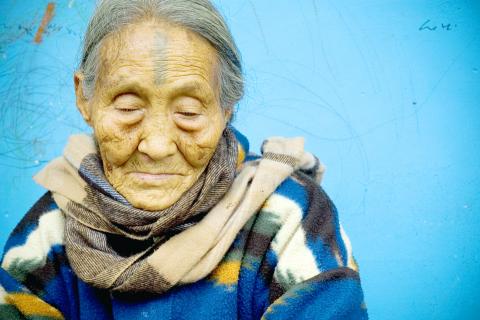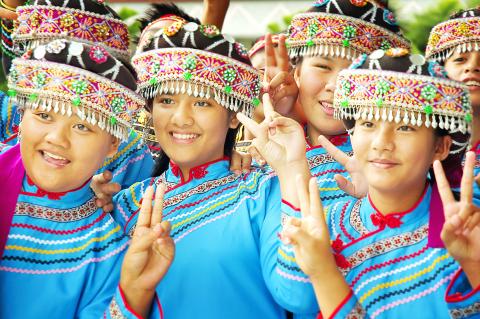While growing up in the US, Tony Coolidge (陳華友) was told very little about his Taiwanese mother’s background.
“She went through great pains to bring us up American, to keep us speaking English so we could succeed, so we could adapt and fit in,” he says.
After his mother’s death from cancer in 1994, Coolidge visited Taiwan to reconnect with her relatives — and made a life-changing discovery. On a trip to his mom’s hometown of Wulai (烏來) in New Taipei City, Coolidge found out that she was a member of the Atayal tribe. Up to that point, he had never even heard of Taiwanese Aboriginals.

Photo Courtesy of Voices in the Clouds
Coolidge’s quest to find out more about his family’s Aboriginal background — and why it had been hidden from him — is the subject of Voices in the Clouds (眾族同聲), a documentary by director Aaron Hose. Released last year, the film will be shown with Chinese subtitles for the first time at the Urban Nomad Festival’s closing night on Sunday, followed by a question-and-answer session with Coolidge.
Coolidge recalls that on his trip, the topic of his family’s background did not come up until he questioned his aunt about the Aboriginal art he saw on the streets of Wulai.
“I thought, ‘What were Native Americans doing here?’ That’s what it looked like to me,” Coolidge told the Taipei Times on Tuesday. “And then she told me, ‘No, that’s our tribe.’ I thought, ‘Our tribe? Atayal?’ I was surprised, shocked.”

Photo Courtesy of Voices in the Clouds
Back home, Coolidge started researching the tribal group’s history. A magazine article he wrote about his trip caught the attention of filmmaker Aaron Hose.
“The fact that while he was visiting Wulai, he discovered that his entire family are descendants of the Atayal tribe, this blew me away,” Hose wrote in an e-mail. “Like Tony, I, too, was surprised that he hadn’t ever heard about it from his mother.”
In late 2005, Hose and his filmmaking team followed Coolidge and his brother Steven on a return trip to Taiwan. Voices is a moving account of Coolidge’s journey to learn more about his ethnic identity. At the same time, it casts a light on the persecution suffered by Taiwanese Aboriginal tribes.
As he found out more about the challenges faced by Aborigines, Coolidge began to understand why his mother never talked about her background. In the film, one Aboriginal elder recalls having to take on different identities in succession: tribal, Japanese, Chinese and Taiwanese. A father describes how classmates labeled his young son a “barbarian.”
“When I first went, it was very evident that there was not a lot of pride about the culture,” Coolidge says. “To me, it was a total avoidance of that culture, in my own family and my relatives. Throughout Taiwan, I got the sense that there wasn’t a positive attitude toward indigenous cultures or people.”
The son of an American GI who left his mother before his birth, Coolidge was born in Taiwan but immigrated to the US when he was a small boy. He grew up on military bases around the world with his mother, stepfather and three younger siblings.
Though she kept her ethnicity hidden from him, Coolidge knew his mother missed Taiwan and dreamed of returning before she was diagnosed with cancer. In a poignant scene, Coolidge recalls a time when he tried to ease his ailing mother’s homesickness by taking her to a Florida amusement park called Splendid China.
Two years later, after she passed away, Coolidge made his first trip to Taiwan as an adult. “After she died, my quest was not about discovering her culture, but about going and reconnecting with her family and bringing back her spirit in a way,” Coolidge says. “Only I discovered something totally unexpected.”
Coolidge says he can relate to the bigotry faced by his Atayal relatives because of the discrimination he experienced as an Asian American. In the American south, his mother and stepfather were viewed negatively for being a mixed-race couple; at school, his classmates taunted him with fake kung fu moves and “ching chong” noises.
“I can’t say I fully understand what my mother went through, but I understand what discrimination was like,” Coolidge says. “It gave me an understanding of why she did what she did to fit in with mainstream culture.”
Despite language and cultural barriers, Coolidge says he has always felt welcomed in Taiwan. He now lives in Tainan with his wife, Shu-min Hsu Coolidge (徐淑敏), and their three children.
In the film, Shu-min is candid about the misconceptions she had about Taiwanese Aborigines before accompanying her husband on his journey of discovery. Voices in the Clouds was made for American audiences, but Coolidge and Hose hope it will give Taiwanese people a chance to reflect on their country’s complex, multi-layered ethnic heritage.
Hose says that when the film was screened at US film festivals, several Taiwanese-born audience members told him that they, like Coolidge, were surprised to find out about their home country’s Aboriginal tribes.
“I figured, ‘How are we ever going to help preserve a dying culture if people from their own country don’t even know the culture exists?’” Hose said. “Raising awareness is the first step on a long road toward preservation.”
“It’s from having a strong sense of belonging that you have a foundation to move forward in your life,” Coolidge added.

April 14 to April 20 In March 1947, Sising Katadrepan urged the government to drop the “high mountain people” (高山族) designation for Indigenous Taiwanese and refer to them as “Taiwan people” (台灣族). He considered the term derogatory, arguing that it made them sound like animals. The Taiwan Provincial Government agreed to stop using the term, stating that Indigenous Taiwanese suffered all sorts of discrimination and oppression under the Japanese and were forced to live in the mountains as outsiders to society. Now, under the new regime, they would be seen as equals, thus they should be henceforth

Last week, the the National Immigration Agency (NIA) told the legislature that more than 10,000 naturalized Taiwanese citizens from the People’s Republic of China (PRC) risked having their citizenship revoked if they failed to provide proof that they had renounced their Chinese household registration within the next three months. Renunciation is required under the Act Governing Relations Between the People of the Taiwan Area and the Mainland Area (臺灣地區與大陸地區人民關係條例), as amended in 2004, though it was only a legal requirement after 2000. Prior to that, it had been only an administrative requirement since the Nationality Act (國籍法) was established in

Three big changes have transformed the landscape of Taiwan’s local patronage factions: Increasing Democratic Progressive Party (DPP) involvement, rising new factions and the Chinese Nationalist Party’s (KMT) significantly weakened control. GREEN FACTIONS It is said that “south of the Zhuoshui River (濁水溪), there is no blue-green divide,” meaning that from Yunlin County south there is no difference between KMT and DPP politicians. This is not always true, but there is more than a grain of truth to it. Traditionally, DPP factions are viewed as national entities, with their primary function to secure plum positions in the party and government. This is not unusual

US President Donald Trump’s bid to take back control of the Panama Canal has put his counterpart Jose Raul Mulino in a difficult position and revived fears in the Central American country that US military bases will return. After Trump vowed to reclaim the interoceanic waterway from Chinese influence, US Defense Secretary Pete Hegseth signed an agreement with the Mulino administration last week for the US to deploy troops in areas adjacent to the canal. For more than two decades, after handing over control of the strategically vital waterway to Panama in 1999 and dismantling the bases that protected it, Washington has